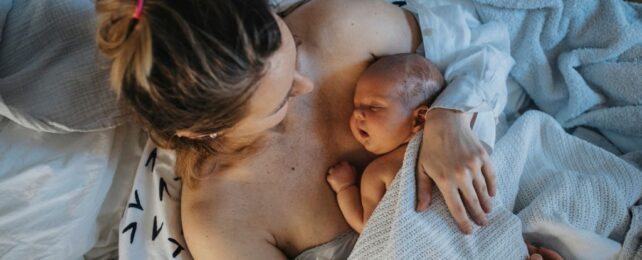Babies born via cesarean section (also known as C-section) miss out on a swipe of bacteria from their mother's vagina as they come down the birth canal, which impacts the newborn's microbiome, and may or may not impact their future health and development as well.
While scientists try to figure that out, a small new study lead by researchers from Southern Medical University in China suggests the practice of 'vaginal seeding', where a cotton gauze is doused in a mother's vaginal fluid and smeared on the newborn baby, could be an effective way to rebalance gut bacteria following a C-section.
Vaginal seeding could even have a positive impact on a child's short-term brain development, at least for the first six months of life, researchers argue, although far more research is needed before the practice can be properly recommended.
In the current experiment, the lips, skin, and hands of 32 newborns delivered via C-section were treated with a carefully screened vaginal swab that had been taken from their mother 2 hours prior to the birth. Babies were swabbed for approximately 15 seconds, and weren't bathed in their first 12 hours.
Six weeks later, the poop from these babies contained more of their mother's bacteria and more mature bacteria than 36 other babies born via C-section that were only swabbed with a simple saline solution.
Six months after birth, compared with those smeared with saline swabs, children who received the vaginal swab scored higher on a brain development survey filled out by their parents. Their scores were on par with the development of babies born vaginally, researchers say.
All parents were blind to what treatment their baby had received.
"We don't know exactly how early gut bacteria affect their neurodevelopment," admits Yan He, who studies the microbiome at Southern Medical University, "but there is some indirect evidence that shows some microbial metabolites are related to conditions."
For instance, some bacteria, like Lactobacillus, were more dominant in
the feces of babies given a vaginal swab. This is interesting as Lactobacillus has been shown to improve a neurological condition in an animal model.
Still, it's not clear if the Lactobacillus levels detected in the current study have long-term effects on baby brains.
While C-section babies do show a different range of bacteria in their guts compared to those born vaginally, some studies suggest the differences disappear after about 9 months. The current study only tested the microbiomes of babies for 42 days.
It's true that at a population level, some studies have linked C-sections to an increased likelihood of childhood obesity, asthma, and diabetes later in life.
But whether that association is directly driven by gut bacteria in babies or can be alleviated with vaginal seeding remains unclear.
To date, there simply isn't enough evidence to recommend vaginal seeding after a C-section. Its proposed benefits are based on uncertain science, and there are potentially severe and fatal consequences if babies are accidentally exposed to harmful pathogens.
The British Medical Journal and the United States American College of Obstetricians and Gynecologists both caution against the practice.
That doesn't mean there isn't a point to studying the effects in a highly controlled clinical study. But there's reason to remain skeptical.
In 2018, a large review on vaginal seeding studies found no support for the practice.
Instead, researchers argued that vaginal seeding studies should compare babies born via C-section to those born via vagina, which the current study did not do.
"If passage through the vagina seeded babies with vaginal bacteria, we would expect to find these bacteria in babies born this way, but this is not the case," explained microbiologist Lisa Stinson from the University of Western Australia in 2018.
"Microbes thrown out of balance in babies born by C-section are very similar to those thrown off balance in babies born to mothers receiving antibiotics but delivering vaginally. It is likely that routine antibiotic administration given to mothers delivering by C-section is a major underlying problem."
What's more, in 2020, the authors of a pilot study argued that what C-section babies were really missing was not exposure to their mother's vaginal bacteria, but exposure to her intestinal bacteria.
Comparing the microbiomes of babies born vaginally and by C-section, researchers found "vaginal swabbing does not correct the [C-section-induced] microbiota imbalance," compared to babies born vaginally.
But a poop transplant did.
Yan He and his colleagues plan to keep studying the potential neurodevelopmental effects of vaginal seeding, but it's worth keeping in mind there may be more to the story than missing bacteria from one part of the body.
The study was published in Cell Host & Microbe.
